Phase 2 study to compare INBRX-101 to plasma derived A1PI therapy in adults with AATD emphysema
- Investigator
- Jorge E Lascano
- Status
- Accepting Candidates
- Ages
- 18 Years - 80 Years
- Sexes
- All
Update your location to show providers, locations, and services closest to you.
Emphysema is a long-term lung condition that causes shortness of breath due to damaged and enlarged air sacs in the lungs (alveoli).
Those suffering from emphysema see a reduction in the amount of oxygen that reaches the bloodstream. That happens as a result of smaller surface area in the lungs from the degrading and rupturing of the inner walls of the air sacs.
Emphysema and another condition, chronic bronchitis, are the two major forms of chronic obstructive pulmonary disease (COPD).
Pulmonary emphysema, chronic obstructive pulmonary disease (COPD).
Although there are many things that can lead to the development of emphysema, the vast majority of occurrences arise from exposure to cigarette smoke. Even in the case where genetics are a factor, like in panacinar emphysema (see above), the inflammation is usually spurred by inflammatory compounds, many of which are found in tobacco smoke. The risk is associated with the number of years and the amount of tobacco the person has been smoking.
Due to the gradual onset of emphysema, one can have the condition for several years without noticing any signs or symptoms. The main symptom is shortness of breath, but smokers may simply attribute that to their smoking habits. Others may attribute it to their older age or being physically unfit. Some may also steer clear of activities that cause them to be winded, thus leaving it somewhat unnoticed. However, emphysema in advanced stages can cause shortness of breath even while resting.
There is no cure for emphysema, but there are different approaches to slow its progression and treat symptoms.
There are a few different types of medications a doctor might prescribe.
Those with advanced emphysema can benefit from a couple different surgical options.
Emphysema is a chronic lower respiratory disease, the third-leading cause of death in the United States. It is a chronic, progressive disease that affects the quality of life at least as much as the length of life.
Similar to many chronic diseases, the prognosis is affected by too many variables to be discussed here. There is no cure, but there are effective methods of treatment, which can slow the progression of the disease and allow for a normal life.
In short, the diagnosis of emphysema is not a death sentence. Rather, it is a medical condition that should prompt you to take an active role in the management of your disease. Quitting smoking is the best first step. Regular visits to your doctor and taking medications as prescribed are also very important. However, the prognosis decreases if the individual decides to continue to smoke.
Don't smoke and avoid secondhand smoke. If you work with chemical fumes or dust, wear a mask to protect your lungs.
UF Health research scientists make medicine better every day. They discover new ways to help people by running clinical trials. When you join a clinical trial, you can get advanced medical care. Sometimes years before it's available everywhere. You can also help make medicine better for everyone else. If you'd like to learn more about clinical trials, visit our clinical trials page. Or click one of the links below:
Phase 2 study to compare INBRX-101 to plasma derived A1PI therapy in adults with AATD emphysema
University of Florida Health researchers are on a mission to provide prevention education and effective treatment for chronic obstructive pulmonary disease, or…

November 8, 2017
A protein produced by the liver significantly reduces the chronic, low-grade inflammation that may contribute to aging and aging-related diseases, a group of…
Department of Molecular Genetics and Microbiology, Department of Pharmaceutical Outcomes and Policy, +6 more

Exercise is an important part of staying healthy, but it can be quite a challenge for people with breathing problems. That’s because we use more oxygen during exercise than when we’re still. A...